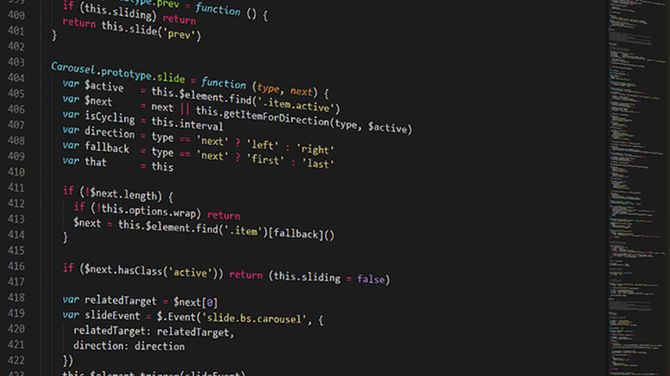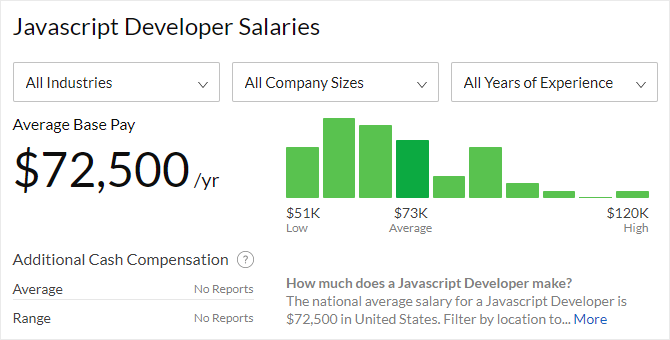With dozens of industry-standard programming languages and hundreds of other active languages to consider, picking the best programming language to learn can be tough. If you're going to pour thousands of hours into study and practice, you want the result to be worthwhile.
To be fair, there are lots of strong options (including Java, Python, C#) and you can't go wrong with any of them. But if you could only pick one language to learn and master for the future, there's no contest: it must be JavaScript.
JavaScript Is Easy to Pick Up
A disclaimer up front: "easy" is relative when it comes to programming languages. If you have no coding experience, then it's going to be a tough road no matter which language you pick. But compared to alternatives, JavaScript is way up there on the easy scale.
In fact, we've previously recommended JavaScript for programming newbies.
JavaScript also has an extremely lenient syntax. There are multiple ways to approach a problem, and it isn't opinionated so it doesn't force you to write code in a particular way. Want to use an object-oriented structure? That's fine. Or not? That's fine too.
JavaScript is dynamic and weakly typed, so you don't have to worry too much about strict data structures, variable assignments, etc. It's loose and flexible and results in code that's short, readable, and the exact opposite of verbose.
JavaScript is one of the highest-level programming languages available today, which means it's far removed from the nitty-gritty details of how computers operate. You write human-readable code that gets translated by a JavaScript engine, and you never have to deal with memory, caches, bits, or anything else that could trip you up hard.
Learn more about the differences between high-level and low-level languages.
JavaScript also has a huge community of veterans and beginners alike. You can find an abundant number of free tutorials and online courses with a single web search, as well as several paid courses, most of which are well worth the money. Resources are endless. Forums are plentiful. If you ever feel stuck, you can always find sources of help.
JavaScript Can Be Used for Everything
Okay, "everything" might be hyperbolic. But it's true that JavaScript is arguably the most versatile language of all time, able to create all kinds of software and applicable to pretty much every kind of programming.
Some interesting things you can do with JavaScript:
- Dynamic websites. JavaScript is the only language that can create dynamic web front-ends, so it's a must-learn if you want to create advanced web tools. But these days, JavaScript can also be used for the back-end server processing, replacing more traditional languages like PHP and ASP. We recommend the React web framework, which handles both front-end and back-end!
- Mobile apps. That's right, JavaScript can be used to create both Android and iOS apps! And not just web apps wrapped up in a mobile engine, but truly native apps. See our roundup of JavaScript mobile frameworks to get an idea of what's out there and what's possible.
- Cross-platform desktop apps. You can create full-featured desktop apps using JavaScript and the Electron open framework. In many cases, this allows you to maintain a web app and additionally export to desktop platforms with minimal effort. High-profile example apps include Visual Studio Code, Discord, and Mailspring.
- Bots and API tools. GitHub is packed with tons of open-source JavaScript bots and codebases that you can use to create interesting tools, especially ones that interact with existing APIs provided by services (e.g. Slack, Discord, PayPal, Spotify, Reddit, etc).
- Raspberry Pi and Arduino. Of the many different ways to use a Raspberry Pi, one of the more interesting ideas involves automating aspects of your home using a combination of Raspberry Pi, Arduino, and Node.js (a JavaScript environment).
- Programmable drones. If you're into drones and quadcopters, then you may be interested in Nodecopter, a Node.js library that lets you program a Parrot AR 2.0 drone to do things like take off, set down, rotate, fly a particular path, and more.
JavaScript Coders Are in High Demand
According to the TIOBE Index, JavaScript is the 6th most popular language worldwide. According to Gooroo Analytics [Broken URL Removed], JavaScript is the second-highest in-demand programming language for professionals in the United States, beaten only by the ubiquitous Java. In December 2017, there were over 7,200 JavaScript job postings per month.
According to PayScale, the average base salary of a JavaScript developer is $72,500. If you niche down, it can get much higher. For example, the Front-End Web Developer position has an average base pay of $88,500 while the Senior Front-End Developer position has an average base salary of $119,500.
Your mileage may vary, of course, but all of this just goes to show that you can make a decent living with JavaScript if you sharpen your skills and put yourself out there. And because JavaScript is so versatile, you can switch industries or career paths without having to learn a new programming language if you don't want to.
Learn more about the most in-demand computer programming jobs, how to write the perfect programming job resume, and how to prepare for a programming interview.
JavaScript Has a Bright Future
ECMAScript is basically a standardized version of JavaScript that aims to improve on the language's built-in weaknesses. ECMAScript 6, also known as ES6, was released in 2015 and played a huge role in revolutionizing the future value of the language. Learn more about how ES6 changed the face of JavaScript.
Since then, ECMAScript has been updating on a yearly schedule, with ES6/ES2015 followed by ES2016 and more recently ES2017. As of this writing, ES2018 has been in the works for many months and it'll be several more months until it's actually released. In addition, there's always a future version in the works (codenamed ES.Next).
In other words, JavaScript is an evolving language that's adapting the needs of its community and the needs of the world.
And let's not forget the general growth in web development as a whole. Web apps are all the rage, and there's no sign of this trend stopping. Many Internet of Things devices need their own custom web portals and interfaces. And as more mobile and desktop apps are written in JavaScript, they'll still need JavaScript coders to maintain them in 5-10 years.
How to Learn JavaScript Right Now
We've looked at some great free resources for learning JavaScript, including a number of YouTube programming tutorial playlists (see the ones for JavaScript and Web Development). If you have some money to spare, you might also check out these JavaScript courses on Udemy.
Whatever you do, we highly recommend reading our article on tricks for mastering a new programming language. You'd also benefit from our comparison of the best JavaScript editors.
How do you feel about JavaScript? Is there another language you'd consider to be "the language of the future"? Let us know in the comments below!




